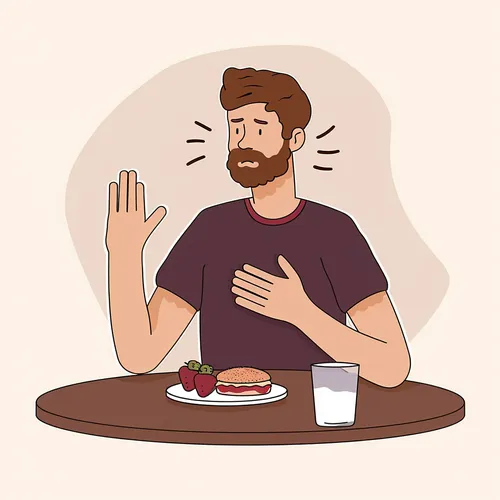Gastritis is a broad term for inflammation or irritation of the lining of the stomach. It can come on suddenly (known as “acute gastritis”) or gradually (known as “chronic gastritis”). The term ‘acute’ means that the attacks are short, not necessarily that the symptoms are severe. The term ‘chronic’ means the infection has developed slowly, and there may be few symptoms.
What Causes Gastritis?
Gastritis is often triggered by a viral infection, excessive alcohol consumption, a poor diet, smoking or vaping, or taking drugs, such as aspirin and anti-inflammatory drugs, over an extended period. However, nearly always, the main cause of gastritis is the presence of a bacterium called Helicobacter Pylori (H.pylori), which is the same bug that causes peptic ulcers.
Alcohol: Drinking a lot of alcohol irritates and inflames the stomach lining, causing acute gastritis. Drinking way too much over time can also lead to chronic gastritis. Definitely not good for your tummy!
Unhealthy Snacks: Eating lots of fatty, spicy, or super acidic foods is a recipe for gastritis. These foods are just too much for your stomach to handle easily. All that spice and fat can really bug your stomach lining. No thank you!
Smoking: Smoking cigarettes has been linked to a higher risk of both acute and chronic gastritis. All those nasty chemicals in cigarette smoke damage the protective stomach lining. Not a good combo with that sensitive tummy!
Medicines: Some medicines like aspirin, ibuprofen, and naproxen can irritate and inflame your stomach lining too, leading to gastritis. Taking those for too long increases the chronic gastritis risk. Be careful!
H. Pylori Infection: The most common cause of chronic gastritis is an infection from that bacteria called H. pylori. This little guy likes to live in your stomach lining and trigger inflammation. Uh oh, chronic gastritis and higher ulcer risk – double whammy! Test yourself with an H. pylori test kit at home if you are worried about having it.
How Likely is it to Have Gastritis?
Gastritis occurs most often among the elderly, but it can affect anyone at any age.
Symptoms Associated with Gastritis
A wide selection of stomach ailments symptoms may suggest that you have gastritis. Your symptoms will be a result of the type of gastritis you are suffering from. For example, people with chronic gastritis may have no severe symptoms but experience nausea or a slight loss of appetite . The most common symptoms of gastritis include:
- Bad taste in the mouth
- Diarrhoea
- Indigestion
- Loss of appetite
- Nausea
- Upper abdominal discomfort or pain
- Vomiting
How is Gastritis Diagnosed?
Your doctor may decide that you have gastritis, based on your symptoms. This initial diagnosis is generally based on the patient’s reported symptoms and the doctor’s experience in treating such cases. However, if the doctor is unsure about the problem or requires more definitive confirmation, a visual examination of the stomach through an endoscope may be required.
An endoscopy is a minimally invasive procedure that allows the doctor to directly look at the stomach lining. An endoscope is a thin, flexible telescope with a light at the end, passed into the stomach via the mouth. This devices sends real-time images of the stomach’s interior to a monitor, enabling the doctor to assess the condition of the stomach lining.
Your doctor may also order a blood test to see if the presence of H.pylori is causing your symptoms. This blood test can detect antibodies produced by the body in response to the H. pylori infection, helping to confirm the presence of the bacteria.
How is Gastritis Treated?
The treatment for gastritis depends on the cause of the inflammation. Looking after yourself at home is often the easiest and most effective treatment for mild gastritis. Antacid products such as rennies or milk of magnesia, which you can pick up from any chemist or large supermarket, may help with the symptoms of gastritis. Ask your local pharmacy for advice.
If your gastritis is caused by H.pylori, you may be given antibiotics to eliminate the bug.
As soon as you experience symptoms of gastritis, you should avoid solid foods and drink plenty of water, milk, and other non-fizzy liquids to stop dehydration.
What Can I Do to Prevent Further Attacks?
If you have gastritis, you should stick to a healthy diet, stop smoking, and cut down on alcohol and caffeine. You should also steer clear of anything that can be hard to digest,including hot or spicy foods. If possible, you should also steer clear of any drugs that irritate your stomach.
Supplements of zinc and vitamin A may help to heal the stomach lining. However, you should speak to your doctor before taking any supplements.
See Your Doctor If:
- If you are vomiting blood or have black stools.
- Severe stomach pain, as this could be a sign of a peptic ulcer.
Photo “Gastritis” by Anthony Cunningham for Zoom Health
Zoom Health is a leading UK supplier of Home Health Tests and Earplugs





